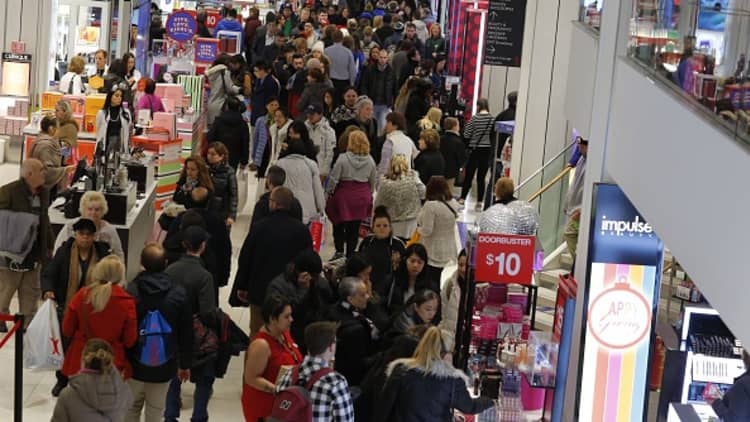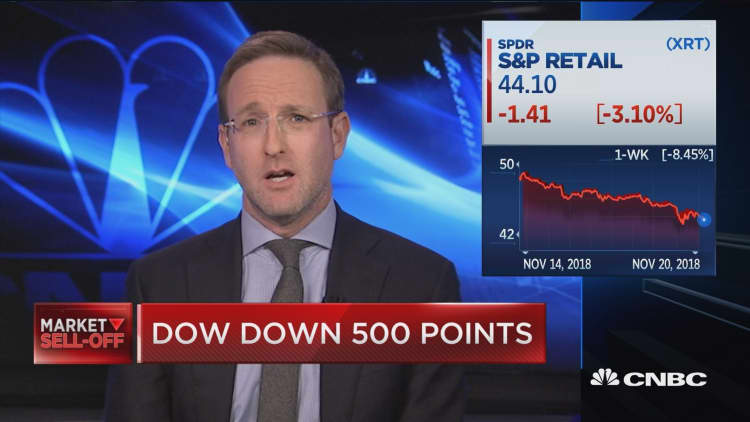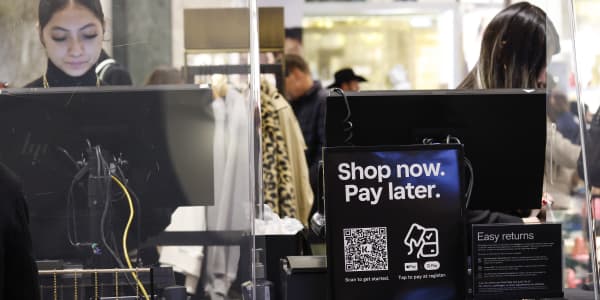Executives at most of the major retailers were confident in recent third-quarter earnings calls that shoppers will show up at stores and online in full force this holiday season. But skeptical investors were unconvinced and sold off their shares en masse Tuesday.
Shares of Target tanked more than 10.5 percent Tuesday on the heels of its earnings report, as Kohl's stock tumbled 9.2 percent, Ross Stores fell 9.4 percent, and Lowe's fell nearly 6 percent. Their lackluster earnings reports also drove the shares of other companies such as Under Armour, Tapestry and Home Depot into the red.
Best Buy was the one major retailer that saw its shares climb for the day, closing up more than 2 percent, after its quarterly earnings and sales topped Street expectations. The electronics retailer's stock stumbled by nearly 2 percent earlier in the day, falling with much of the companies included in the S&P 500 Retail ETF. The index of retail stocks fell 3.3 percent Tuesday and 11.4 percent over the last eight trading days.
"Everything we are seeing about the consumer is very positive," Best Buy CEO Hubert Joly said on a call with reporters Tuesday. "The consumer is in great shape, there is no doubt."
Holiday sales are expected to grow near 5 percent this year. Low unemployment in the U.S., coupled with rising wages, are giving companies such as Macy's and Walmart confidence to predict they'll sell more this year than in past holiday seasons. Walmart CEO Doug McMillon said there is "momentum in the business as we execute our plan and benefit from a favorable economic environment," according to a statement posted on its web site after it reported earnings last week.
Target CEO Brian Cornell mirrored Joly and McMillon, telling reporters on a conference call Tuesday that consumer spending is still strong.
"There is no indicator as we sit here today that the consumer environment is slowing as we enter the holiday season," Cornell said.
He raved about the U.S. economy earlier this year, saying it was one of the best he'd ever seen in his career.

Still, investors aren't cheering the news. They're paying closer attention to pressures on profits. While Target's third-quarter sales were up, its earnings slightly missed the mark. And Kohl's beat analysts' quarterly expectations, but its full-year profit outlook was on the low end of Wall Street forecasts.
"I think there has been some skittishness around retail," KeyBanc analyst Ed Yruma told CNBC. "Like, is this as good as it gets?"
Investors are starting to look past the holiday season and are already thinking about 2019, he added. There's the threat of new tariffs on Chinese goods going into place next year, along with predictions the economy may cool and force consumers to pull back on spending. Retailers, meanwhile, are still expected to invest in their websites and mobile apps to keep pace with Amazon and other major e-commerce brands.
"You grow online ... you're going to have some expense structure against your margin because you're doing things," Jan Kniffen, CEO of consulting firm J Rogers Kniffen WWE, told CNBC's "Power Lunch." "That's a problem with the group, whether you're Macy's or Walmart or Target ... You're having some expenses go up because of all the great online business you're doing, but that's what you have to do to grow."
Spending online is predicted to climb more than 14 percent this holiday season, compared with growth of 2.7 percent at bricks-and-mortar retailers. But the majority of retail sales in the U.S., nearly 90 percent, still takes place at stores, according to the U.S. Commerce Department.
Looking past the holidays, the first and second quarters for retailers across the board should be "pretty good," Kniffen said. But, "at some point the tax law effects start to slow down, and we'll start to see that in the business."





